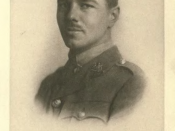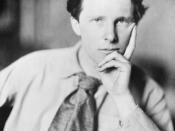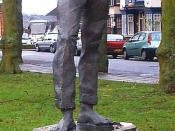For this task I will use two separate poems from different poets during the time of World War One, which have different views and then I will talk about what impression they give me of World War One. For my first poem, I chose 'Dulce Et Decorum Est' by Wilfred Owen and for my second poem I chose 'Peace' by Rupert Brooke.
I chose Wilfred Owen because he use's a lot of irony. Owen was a soldier at the time of war and because of this, his poem is a primary piece of text vital to historians because he was there at the scene and whatever is written in his poems could have potential value and evidence of what the period 1914 to 1918 was actually like in terms of the war.
Owen wrote his poetry to express his views on the war and to get across the idea that war is not as great as it first seems.
In Owens's first stanza he sets the scene, we are presented with the phrase 'Blood-shod' (line 7). It gives the impression that men fighting in the war are no better than animals being slaughtered in the wild by vengeful hunters. Like all wars, in order to win there must be a sacrifice of some kind thought by Sir Douglas Haig in the Battle of the Somme. In the poem there is break in the rhyme and so this also helps create the atmosphere in the poem, reflecting the reality of war and keeps me reading the rest of the poem to find out what happens next.
In the second stanza, we are focused on one man who couldn't get his gas helmet on in time. Owen uses two words here that clash: "ecstasy" and "fumbling". Ecstasy...


